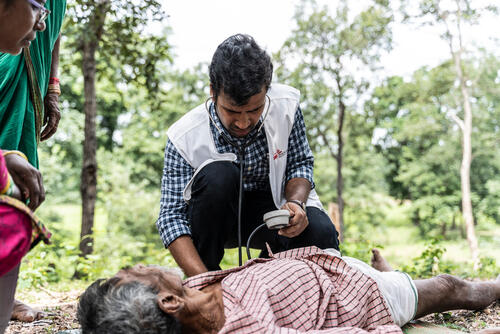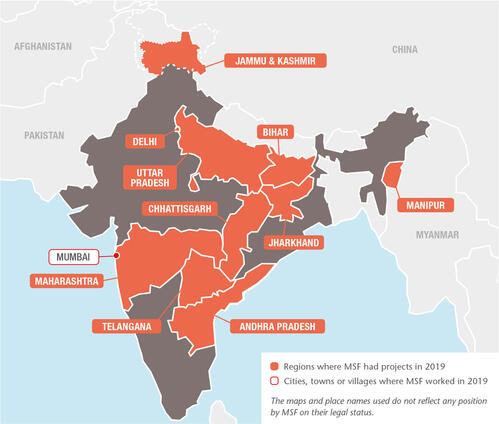
55,000
55,
4,540
4,54
2,360
2,36

1,440
1,44
1,390
1,39
960
96
Médecins Sans Frontières (MSF) continues to work with vulnerable communities, providing mental healthcare and treatment for infectious diseases, drug-resistant tuberculosis (DR-TB), sexual violence and malnutrition.
Specialised care for TB, HIV and hepatitis C in Manipur
Manipur has a high prevalence of HIV, hepatitis C and both drug-sensitive and drug-resistant forms of TB. Due to limited healthcare services in the state, it also has a high incidence of co-infection, making patients more vulnerable and treatment more difficult.
Through our clinics in Churachandpur, Chakpikarong and Moreh, and a new one built and inaugurated in 2019 in Chakpikarong, near the Myanmar border, our teams offer screening, diagnosis and treatment, as well as counselling and health education for all three diseases.
Mental healthcare in Jammu and Kashmir
Since 2001, we have been offering counselling services in Jammu and Kashmir, where years of conflict have taken a severe psychological toll on residents. This is compounded by the stigma associated with mental health issues. In 2019, our teams worked in hospitals in four districts – Srinagar, Baramulla, Pulwama and Bandipora – and assessed the mental health situation in most of the rest of the state. As a result of our findings, we are expanding our activities at community level in Sopore and Pulwama districts.
Sexual and gender-based violence in Delhi
In 2015, we opened a 24-hour clinic in North Delhi’s Jahangirpuri district for victims of sexual and domestic violence. Services include post-exposure prophylaxis to prevent HIV/AIDS, unwanted pregnancies and sexually transmitted diseases, as well as psychosocial support. We also run counselling services at the local district hospital.
We continued to work with local authorities and community-based organisations to raise awareness of our services throughout 2019. We also published the initial findings of our Knowledge, Attitudes, Practices (KAP) survey, which will increase the understanding of sexual violence and help MSF and others address it more effectively.
Advanced HIV project in Bihar
Patients with HIV continue to face substantial discrimination and limited access to care within the public and private health systems. Bihar, one of the most populous states in India, remains far from the UNAIDS 90-90-90 targetsThe globally agreed 90-90-90 targets require that 90 per cent of people living with HIV know their status; that 90 per cent of people diagnosed with HIV initiate and remain on ARV treatment; and that 90 per cent of people on ARV treatment reach and maintain an undetectable viral load by 2020. for people living with HIV. MSF has in 2019 been focused on providing high level holistic care to the most vulnerable and unwell population of people living with HIV/AIDS, those with advanced HIV. We support the Ministry of Health in managing a dedicated holistic care inpatient ward that ensures patients are treated in a dignified manner, while providing safe and targeted treatment and – where appropriate – palliative care for their life-threatening opportunistic infections. In parallel, we work with the government and the Access Campaign to improve the guidelines and access to essential diagnostics and drugs that these critical patients require.
Treating severe acute malnutrition in Jharkhand
MSF has been working with the health authorities in Jharkhand to identify and treat children with severe acute malnutrition since 2017.
In 2019, we treated nearly 1,000 children with severe acute malnutrition through 47 outpatient feeding centres in rural and tribal areas of the state. MSF also conducted operational research to identify the optimal mid-upper arm circumference (MUAC, a screening method used to assess a child’s nutritional status) for management of children with severe acute malnutrition. The aim is to give policymakers the best chance of upscaling community-based management of this condition. The results of the study will be shared with policymakers and health workers to demonstrate a model for better identifying child malnutrition.
Treating DR-TB and HIV in Mumbai
Since 1999, MSF has been working in close collaboration with the national TB and HIV programmes in Mumbai to reduce the incidence and mortality rates of the diseases. In M/East ward, which has one of the highest rates of TB in the city, we run an independent clinic that offers comprehensive care for HIV and DR-TB patients, including those with very complex drug-resistance patterns. These patients require treatments that are difficult to obtain in either the public or the private sector. Our project was one of the first sites in the world to provide the newer drugs, bedaquiline and delamanid, to both adult and paediatric patients with advanced DR-TB resistance.
In addition to the cutting-edge work undertaken in our clinic, we work with the national TB programme to strengthen DR-TB management in M/East ward through the outpatient department of a public hospital. We also support a TB hospital in Sewri in south Mumbai – the biggest in Asia – by providing DR-TB treatment for complicated cases and psychosocial assistance. In 2019, we extended our TB activities to eight health posts in the community.
Treating hepatitis C in Uttar Pradesh
Since 2017, we have supported the Ministry of Health in Meerut, Uttar Pradesh, to develop an effective, decentralised and simplified programme to diagnose and treat hepatitis C. We handed the programme over to the ministry in 2019. In two years, more than 10,000 people were tested for hepatitis C. Of those, 3,675 initiated treatment, 3,435 finished it and 3,430 were cured. Between August and December 2019, 433 community influencers and service providers (village heads, rural practitioners, barbers), 1,156 community-based health workers and 2,978 students received basic training in raising awareness about hepatitis C prevention in western Uttar Pradesh.
Healthcare for hard-to-reach communities
MSF runs mobile clinics offering general healthcare to people living in remote villages in Andhra Pradesh, Chhattisgarh and Telangana, three states in eastern India affected by longstanding, low-intensity conflict. General healthcare, treatment for malaria, TB and respiratory infections, ante- and postnatal care, vaccinations and referrals are all available through the clinics. We also carry out health promotion and disease surveillance activities.

















